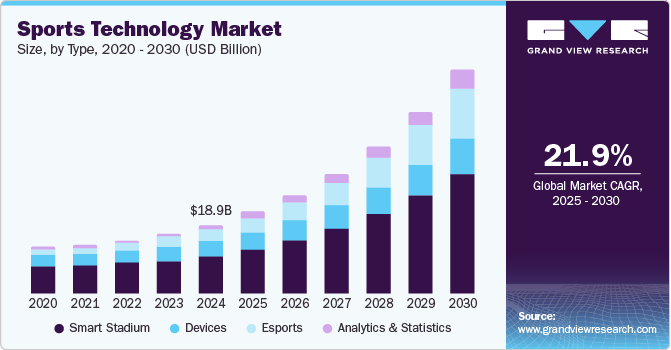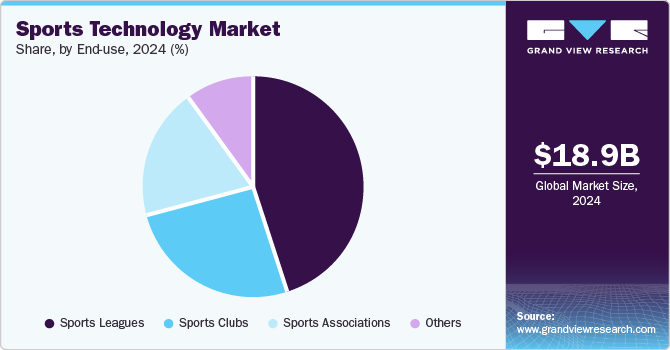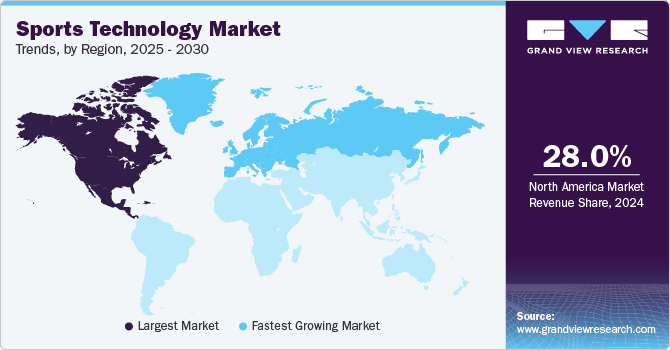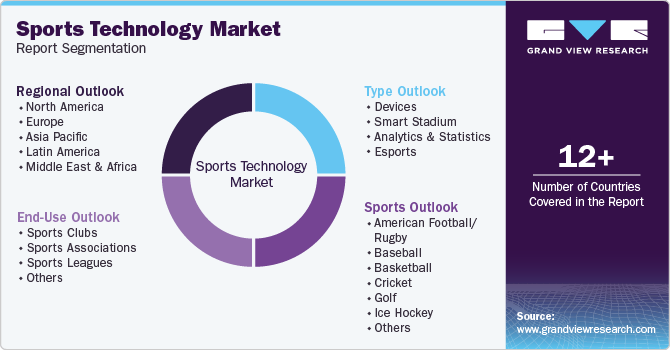- Home
- »
- Next Generation Technologies
- »
-
Sports Technology Market Size, Share, Industry Report, 2030GVR Report cover
![Sports Technology Market Size, Share & Trends Report]()
Sports Technology Market (2025 - 2030) Size, Share & Trends Analysis Report By Type (Devices, Smart Stadium, Esports), By Sport (Baseball, Cricket), By End Use, By Region, And Segment Forecasts
- Report ID: GVR-3-68038-736-0
- Number of Report Pages: 150
- Format: PDF
- Historical Range: 2018 - 2023
- Forecast Period: 2025 - 2030
- Industry: Technology
- Report Summary
- Table of Contents
- Segmentation
- Methodology
- Download FREE Sample
-
Download Sample Report
Sports Technology Market Summary
The global sports technology market size was estimated at USD 18,850.3 million in 2024 and is projected to reach USD 61,720.6 million by 2030, growing at a CAGR of 21.9% from 2025 to 2030. The growth can be attributed to the increasing need for technology-based services in the sports arena driven by a strong emphasis on the involvement of audience and entertainment activities and the digital transformation of arenas/stadiums.
Key Market Trends & Insights
- The North America sports technology market held the largest global revenue share of over 28% in 2024.
- The U.S. sports technology industry held a dominant position in 2024 in the North America region.
- By type, the smart stadium segment recorded the largest revenue share of over 53% in 2024.
- By sports, the soccer segment accounted for the largest revenue share in 2024.
- By end use, the sports leagues segment accounted for the largest revenue share in 2024
Market Size & Forecast
- 2024 Market Size: USD 18,850.3 Million
- 2030 Projected Market Size: USD 61,720.6 Million
- CAGR (2025-2030): 21.9%
- North America : Largest market in 2024
- Asia Pacific: Fastest growing market
As the number of sports events and data-driven decision-making and operations are increasing in demand, the sports technology industry is expected to witness significant growth during the forecast period. The increased usage of data analytics, the Internet of Things (IoT), and social media are also favoring the market expansion further.
Immersive technologies, including virtual reality (VR) and augmented reality (AR), are revolutionizing the fan experience in the sports technology industry by offering innovative ways to engage with games. AR overlays provide real-time stats, player data, and interactive visuals during live matches, enriching the overall viewing experience. On the other hand, VR allows fans to witness games from a player’s perspective or virtually attend matches from the comfort of their own home, a trend gaining traction in the sports technology industry. These immersive solutions are also being implemented for athlete training, enabling players to simulate game scenarios in a controlled, virtual environment. The increasing demand for personalized, immersive experiences is propelling investments in VR and AR within the sports technology industry as more organizations look to enhance fan engagement and provide dynamic, interactive content.
The sports technology industry is also being influenced by the integration of artificial intelligence (AI) to monitor athletes' health, fitness, and safety. AI-powered wearable devices, such as smartwatches and heart rate monitors, track players’ activity off the field, helping ensure safety during training and workouts. For example, NASCAR utilizes deep learning to analyze data patterns, which can be applied across various commercial sectors, including voice recognition and computer vision. In the sports technology industry, AI is proving essential in keeping track of player health while optimizing performance both on and off the field.
Wearable technology, including fitness trackers, smart apparel, and sensor-embedded equipment, is transforming the sports technology industry by allowing athletes to monitor and enhance their performance in real time. These devices provide essential data on heart rate, speed, movement, and energy use, enabling athletes and coaches to make more informed decisions. For example, in team sports like soccer and rugby, GPS trackers are used to analyze player positioning and workload, which helps reduce injury risks. In addition, advanced biosensors in the sports technology industry now allow tracking of hydration, fatigue, and recovery, further the adoption of wearable technology across both professional and amateur sports globally.
AI and machine learning are being widely used in the sports technology industry to analyze vast amounts of data and offer actionable insights. These technologies empower teams to predict player performance, create strategic game plans, and scout talent by analyzing gameplay footage. AI-powered video analytics, for example, can identify patterns and behaviors of opposing teams, providing a competitive advantage. Moreover, predictive algorithms in the sports technology industry are being used to assess injury risks by correlating player biomechanics with historical data, significantly improving the accuracy and efficiency of sports management and coaching.
Type Insights
The smart stadium segment recorded the largest revenue share of over 53% in 2024. The integration of IoT (Internet of Things) technology is transforming smart stadiums by providing fans with real-time, interactive experiences. Mobile apps are playing a central role in this transformation, offering fans the ability to access personalized services such as seat upgrades, in-seat ordering, and live event updates. These technologies not only enhance the convenience of attending live events but also help teams and stadium operators better understand fan preferences. With data collected from IoT devices, teams can offer targeted promotions and customized experiences. This increased engagement boosts fan loyalty and drives new revenue streams for sports organizations.
The analytics & statistics segment is projected to register the fastest CAGR of over 29% from 2025 to 2030. The role of analytics extends beyond athletes to fan engagement, where data is used to personalize the fan experience. By collecting data from ticketing, mobile apps, and IoT devices, teams can understand fan behavior and preferences. This information is then used to offer customized experiences, such as personalized promotions, optimized seating arrangements, or curated content. Analytics also helps identify trends in fan interactions and predict future behaviors, enabling sports organizations to tailor marketing efforts and improve customer service. Ultimately, data-driven insights are enhancing how teams build stronger relationships with their fan base and boost loyalty.
Sports Insights
The soccer segment accounted for the largest revenue share in 2024. The integration of wearable technology in soccer is revolutionizing how athletes monitor their performance and health. Devices such as smart shirts, vests, and GPS trackers allow coaches and players to track metrics like heart rate, speed, distance covered, and player load during matches and training. These wearables provide real-time data that help in assessing player fitness and preventing injuries by identifying early signs of fatigue or strain. The data collected also informs training programs, making them more personalized and effective. As technology advances, there is a growing emphasis on wearables that can also monitor biomechanics, providing deeper insights into movement patterns and potential injury risks.
The basketball segment is anticipated to record the fastest CAGR from 2025 to 2030. The use of analytics and data-driven coaching is transforming how basketball teams evaluate players and develop strategies. Advanced statistical tools provide insights into player performance across a wide range of metrics, such as shooting efficiency, player movement, and defensive positioning. Coaches and front-office staff use this data to refine strategies, matchups, and in-game decisions to maximize team performance. Player tracking technology, such as cameras and motion sensors, enables teams to assess player positioning and movement both on and off the ball. By leveraging data analytics, teams can make more informed decisions, from drafting new players to fine-tuning their game plans for upcoming matches.
End Use Insights
The sports leagues segment accounted for the largest revenue share in 2024, The growing acceptance of sports betting is reshaping how sports leagues operate, particularly in North America. With many leagues entering partnerships with betting platforms, they are creating new revenue streams while offering fans more ways to engage in their favorite sports. Legalized sports betting also brings in new data opportunities, as fan behavior and bet predictions are now tracked and analyzed for marketing and strategy. However, there are concerns about integrity and the potential for match-fixing, prompting leagues to establish tighter regulations and monitoring systems. As betting becomes more integrated into the sports ecosystem, leagues will need to balance revenue opportunities with maintaining the sport's integrity.

The sports associations segment is anticipated to record the fastest CAGR from 2025 to 2030. Sports associations are embracing cutting-edge technology to enhance the sports experience for both athletes and fans. The use of data analytics, wearables, and advanced video analysis is helping associations improve player performance and make data-driven decisions in competitions. In addition, technology is enhancing fan engagement through virtual reality, augmented reality, and interactive apps that offer real-time statistics, live broadcasts, and unique content. Many associations are investing in digital platforms to engage fans in new ways, particularly as more events are streamed online. With technology continuing to evolve, sports associations are likely to continue integrating innovative solutions that improve both athletic performance and fan experience.
Regional Insights
The North America sports technology market held the largest global revenue share of over 28% in 2024. In North America, traditional sports like American football, basketball, and baseball have long dominated the market, but emerging sports are now gaining attention. Sports such as soccer, esports, and mixed martial arts (MMA) are becoming increasingly popular, with younger generations driving this shift. Major sports leagues like the NFL and NBA are expanding their reach by hosting international games, while soccer leagues like MLS are attracting top global talent and boosting their fanbase. Esports is also thriving, with big brands investing in sponsorships, tournaments, and gaming events. As sports diversification continues, North America is likely to become a hub for more niche sports and innovative fan experiences.

U.S. Sports Technology Market Trends
The U.S. sports technology industry held a dominant position in 2024 in the North America region. In the U.S., sports are deeply woven into the fabric of culture, with major leagues like the NFL, NBA, MLB, and NHL leading the charge. The U.S. also stands as a global leader in sports entertainment, with events like the Super Bowl and the NBA Finals attracting massive audiences. With the integration of sports betting becoming more widespread, the U.S. is also seeing a significant shift in fan behavior, adding new layers to the sports experience. The rise of alternative sports such as soccer (MLS) and esports (through platforms like Twitch and the growth of leagues like the eMLS) is reshaping the American sports market.
Europe Sports Technology Market Trends
Europe sports technology industry is expected to grow at a CAGR of over 22% from 2025 to 2030. Europe remains the heart of many of the world’s most prestigious traditional sports leagues, especially in soccer, rugby, and tennis. Countries like the UK, Spain, Italy, and Germany are home to some of the biggest soccer clubs, with global fanbases and immense commercial value through broadcasting rights and sponsorships. The UEFA Champions League, Premier League, and La Liga are just a few examples of high-profile European competitions that attract millions of fans worldwide. Moreover, Europe is also witnessing the rise of niche sports, including handball, motorsports, and cycling, as fan bases grow and tournaments become more accessible. The strong infrastructure, rich history, and competitive leagues will continue to solidify Europe's position as a dominant force in global sports.
The UK sports technology industry is expected to grow rapidly in the coming years. The UK remains a key player in global sports, particularly through the world-renowned English Premier League, which attracts top talent and global viewership. Rugby and cricket are also integral parts of British culture, with iconic events like the Six Nations and the British Open. The UK continues to innovate in fan engagement and sports technology, ensuring its place as a leader in both traditional and emerging sports.
The Germany sports technology industry held a substantial market share in 2024. Germany is known for its excellence in football, with the Bundesliga offering highly competitive matches and Bayern Munich maintaining global prominence. The country is also a major player in motorsports, cycling, and Olympic disciplines, consistently excelling in international competitions. Germany's focus on sports science and advanced technology has played a key role in its continued success across various sporting arenas.
Asia-Pacific Sports Technology Market Trends
The Asia-Pacific sports technology industry is projected to grow at the fastest CAGR of over 24% from 2025 to 2030. The Asia Pacific region is experiencing a rapid transformation in the sports sector, driven by increased investment, infrastructure development, and an expanding middle class. Countries like China, Japan, and India are heavily investing in sports, with an emphasis on soccer, basketball, and cricket. The Chinese government has also set ambitious goals to turn China into a global sports powerhouse by 2030. The region is seeing a surge in fan engagement through digital platforms and the growing presence of international sports leagues and events. Esports is particularly booming in countries like South Korea and China, with large-scale competitions and sponsorships creating a million-dollar industry. As the Asia Pacific market continues to evolve, it will become an increasingly important player in the global sports landscape.
Japan sports technology industry blends tradition and modernity in its sports culture, with baseball and soccer being central to its sports scene. The Tokyo 2020 Olympics showcased Japan's ability to integrate cutting-edge technology, such as robotics and augmented reality, with sporting events. In addition, esports are rapidly growing, making Japan one of the largest esports markets in Asia and contributing to the country's evolving sports landscape.
China sports technology industry has been making significant investments in sports, with the government aiming to make the country a global sports leader by 2030. Soccer is a key focus, with the Chinese Super League attracting big-name players, and basketball is also immensely popular, particularly with the NBA's strong fanbase. The government's emphasis on building sports infrastructure and grassroots programs is helping to foster a sustainable sports culture for future generations.
Key Sports Technology Company Insights
Some of the key players operating in the market include IBM Corporation, and SAP SE, among others.
-
IBM Corporation has long been a leader in sports technology, specializing in artificial intelligence, data analytics, and cloud computing solutions for the sports industry. They have revolutionized fan engagement with their AI-powered platforms, like Watson, which enhances the sports viewing experience through predictive analytics and real-time data. IBM is also a key partner for major sports events like the US Open and Wimbledon, where they provide advanced data processing and analytics services. Their long-standing history in the tech space positions IBM as a trusted and innovative company in sports technology.
-
SAP SE is a mature leader in the sports technology industry, specializing in enterprise resource planning (ERP) solutions and data analytics tailored for sports organizations. SAP provides sports leagues, teams, and event organizers with tools to streamline operations, manage player performance, and enhance fan engagement. Their software solutions help sports businesses with everything from ticketing to merchandise sales, creating efficient, data-driven operations. As sports organizations increasingly rely on technology for decision-making, SAP continues to be a key player in optimizing the operational side of sports industries.
Some of the emerging market players in the sports technology industry include Dream Sports Group and Genius Sports Group, among others.
-
Dream Sports Group, the parent company of platforms like Dream11, has rapidly grown into a leading player in the fantasy sports and sports technology industry. Known for pioneering the fantasy sports ecosystem in India, it now focuses on expanding its offerings into mobile gaming, esports, and online betting. The company's AI-driven platform provides users with personalized fantasy sports experiences, leveraging data analytics to enhance player engagement. With a growing user base and investments in technology, Dream Sports is positioned to become a key player in the global fantasy sports sector.
-
Genius Sports Group has emerged as a trailblazer in the sports data and technology space, offering data-driven solutions for the sports industry. Specializing in real-time sports data and analytics, they provide sports leagues, betting operators, and media companies with comprehensive statistics and insights to enhance fan engagement and business operations. The company’s expertise extends to sports integrity, helping protect leagues and bookmakers from fraudulent activities. As sports betting continues to grow globally, Genius Sports is increasingly playing a central role in the modernization of the sports data ecosystem.
Key Sports Technology Companies:
The following are the leading companies in the sports technology market. These companies collectively hold the largest market share and dictate industry trends.
- Apple Inc.
- Catapult Group
- ChyronHego Corporation
- Cisco Systems, Inc.
- HCL Technologies Limited
- IBM Corporation
- Infosys Limited
- Modern Times Group MTG
- Oracle
- Panasonic Corporation
- SAP SE
- Sony Corporation
- Stats LLC
- Telefonaktiebolaget LM Ericsson
- Amazon Web Services Inc.
- DELTATRE
- Ernst & Young Global Limited
- Genius Sports Group
- Microsoft Corporation
- SAS Institute Inc.
- Sportradar AG
- Synergy Sports
- CBS Sports Digital
- Draft Kings, Inc
- Dream 11 (Sporta Technologies Pvt. Ltd.)
- Dream Sports Group
- FanDuel Group
Recent Developments
-
In June 2023, Infosys Limited launched a mobile app aimed at enriching fan experiences at live sports events by integrating augmented reality. This innovation seeks to increase viewer interaction and satisfaction during games. The app focuses on enhancing engagement through immersive features and real-time content.
-
In May 2023, IBM Corporation formed a strategic partnership with a prominent sports league to leverage its cloud solutions for advanced game data analysis. The collaboration is intended to optimize team performance and improve fan engagement by delivering deeper insights. This move reflects IBM’s commitment to using technology to enhance the sports industry.
-
In April 2023, HCL introduced a cutting-edge AI-driven platform designed to enhance athlete performance analytics. By utilizing real-time data, the platform aims to optimize training processes and improve results. This innovation underscores HCL's focus on delivering technology solutions that support sports performance enhancement.
Sports Technology Market Report Scope
Report Attribute
Details
Market size value in 2025
USD 22,970.4 million
Revenue forecast in 2030
USD 61,720.6 million
Growth rate
CAGR of 21.9% from 2025 to 2030
Base year for estimation
2024
Historical data
2018 - 2023
Forecast period
2025 - 2030
Quantitative units
Revenue in USD million and CAGR from 2025 to 2030
Report coverage
Revenue forecast, company ranking, competitive landscape, growth factors, and trends
Segments covered
Type, sports, end use, region
Regional scope
North America, Europe, Asia Pacific, Latin America, and Middle East & Africa
Country scope
U.S., Canada, Mexico, UK, Germany, France, China, Australia, Japan, India, Australia, South Korea, Brazil, South Africa, Saudi Arabia, U.A.E.
Key companies profiled
Apple, Inc.; Catapult Group; ChyronHego Corp.; Cisco Systems, Inc.; HCL Technologies Ltd.; IBM Corp.; Infosys Ltd.; Modern Times Group MTG; Oracle; Panasonic Corporation; SAP SE; Sony Corporation; Stats LLC; Telefonaktiebolaget LM Ericsson; Amazon Web Services Inc.; DELTATRE; Ernst & Young Global Limited; Genius Sports Group; Microsoft Corporation; SAS Institute Inc.; Sportradar AG; Synergy Sports; CBS Sports Digital; Draft Kings, Inc; Dream 11 (Sporta Technologies Pvt. Ltd.); Dream Sports Group; FanDuel Group.
Customization scope
Free report customization (equivalent to up to 8 analyst’s working days) with purchase. Addition or alteration to country, regional & segment scope.
Pricing and purchase options
Avail customized purchase options to meet your exact research needs. Explore purchase options
Global Sports Technology Market Report Segmentation
This report forecasts revenue growth at global, regional, and country levels and provides an analysis of the latest technology trends in each of the sub-segments from 2018 to 2030. For this study, Grand View Research has segmented the global sports technology market report based on type, sports, end use, and region:

-
Type Outlook (Revenue, USD Million, 2018 - 2030)
-
Devices
-
Wearables
-
Digital Signage
-
Camera
-
-
Smart Stadium
-
Software
-
Stadium & Public Security
-
Building Automation
-
Event Management
-
Others
-
-
Services
-
-
Analytics & Statistics
-
On-field
-
Player & Team Analysis
-
Video Analysis
-
Performance Improvement
-
Refereeing Decisions
-
-
Health Assessment
-
-
Off-field
-
Fan Engagement
-
Content Platforms
-
Fan Experience
-
Fantasy Sports
-
-
Ticket Pricing
-
Others
-
-
-
Esports
-
Tickets & Merchandise
-
Sponsorship & Advertisement
-
Others
-
-
-
Sports Outlook (Revenue, USD Million, 2018 - 2030)
-
American Football/Rugby
-
Baseball
-
Basketball
-
Cricket
-
Golf
-
Ice Hockey
-
Tennis
-
Soccer
-
Others
-
-
End Use Outlook (Revenue, USD Million, 2018 - 2030)
-
Sports Clubs
-
Sports Associations
-
Sports Leagues
-
Others
-
-
Regional Outlook (Revenue, USD Million, 2018 - 2030)
-
North America
-
U.S.
-
Canada
-
Mexico
-
-
Europe
-
UK
-
Germany
-
France
-
-
Asia Pacific
-
China
-
India
-
Japan
-
South Korea
-
Australia
-
-
Latin America
-
Brazil
-
-
Middle East & Africa
-
South Africa
-
Saudi Arabia
-
UAE
-
-
Frequently Asked Questions About This Report
b. The global sports technology market size was estimated at USD 18,850.3 million in 2024 and is expected to reach USD 22,970.4 million in 2025.
b. The global sports technology market is expected to grow at a compound annual growth rate of 21.9% from 2025 to 2030 to reach USD 61,720.6 million by 2030.
b. Europe dominated the sports technology market with a share of nearly 30% in 2024. The growth of the region can be accredited to the wide-scale adoption of advanced technologies in stadiums, coupled with an increasing number of sports leagues/events.
b. Some key players operating in the sports technology market include Apple Inc.; Cisco Systems, Inc.; Telefonaktiebolaget LM Ericsson; Fitbit, Inc.; Fujitsu; Garmin Ltd.; IBM Corporation; Modern Times Group MTG; Panasonic Corporation; Samsung; SAP SE; and Sony Corporation.
b. Key factors that are driving the sports technology market are the significant improvements in audience engagement and upcoming sports events and growth including the growing number of sports leagues across the globe.
Share this report with your colleague or friend.
Need a Tailored Report?
Customize this report to your needs — add regions, segments, or data points, with 20% free customization.

ISO 9001:2015 & 27001:2022 Certified
We are GDPR and CCPA compliant! Your transaction & personal information is safe and secure. For more details, please read our privacy policy.
Trusted market insights - try a free sample
See how our reports are structured and why industry leaders rely on Grand View Research. Get a free sample or ask us to tailor this report to your needs.










